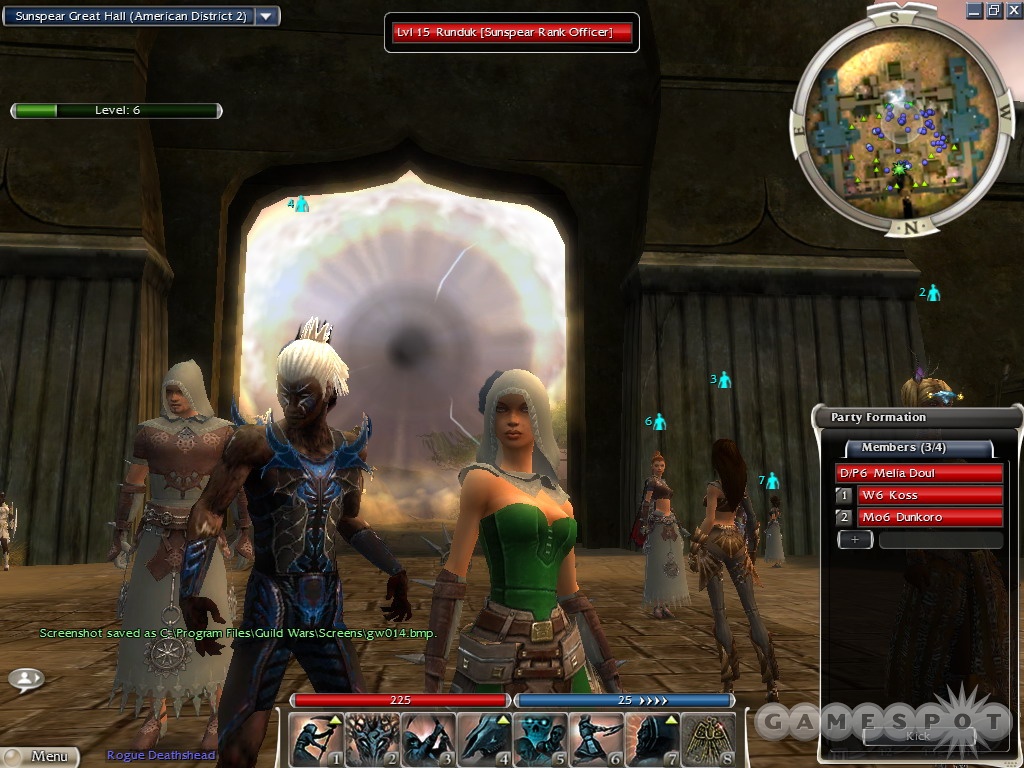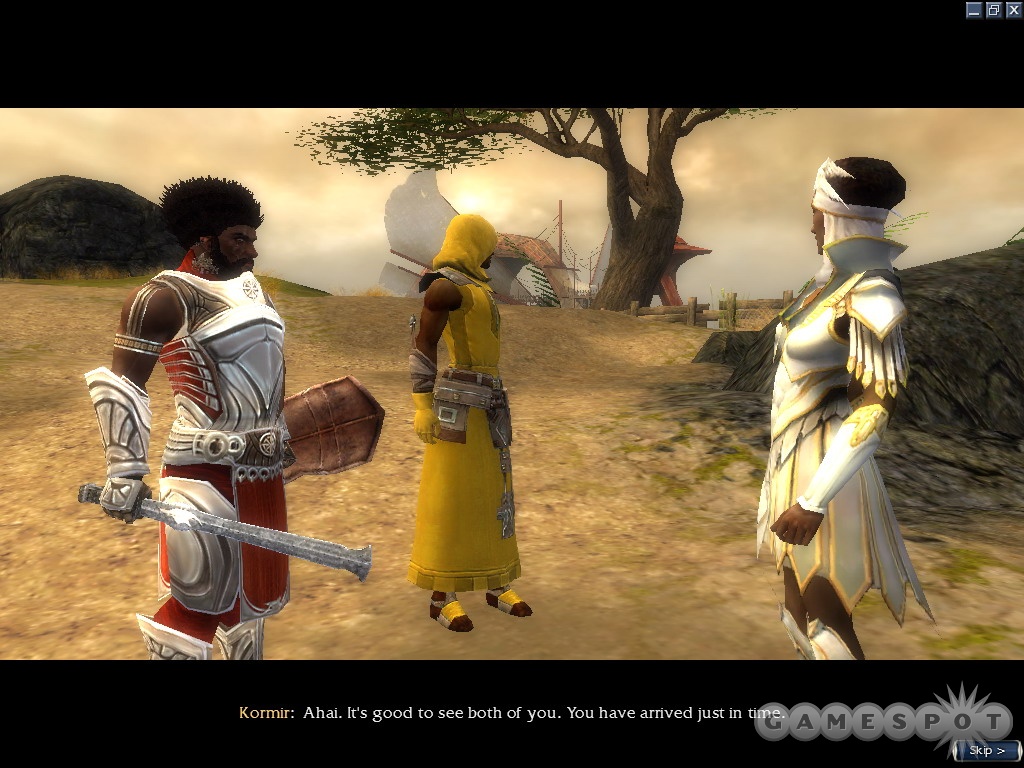It's scarcely been six months since the release of Guild Wars Factions, the follow-up to ArenaNet's innovative online role-playing game, but here comes Guild Wars Nightfall--another massive game featuring plenty of solo, cooperative, and competitive questing and combat. Whereas Factions took place in an Asian-inspired setting, Nightfall has an ancient Egyptian look and feel, and unlike Factions, it's more focused on solo and cooperative questing than on a mix of that and high-level player-versus-player battles. The result is unmistakably similar to the other Guild Wars titles despite a few new features, though it can still be a good starting point for those who haven't given the series a chance yet. However, in spite of all the new content that's on offer in Nightfall's large new continent of Elona, the underlying game hasn't changed much and is starting to show signs of aging.

Guild Wars Nightfall is a stand-alone product just like the other two Guild Wars games, but if you have one or both of the others, they all tie together. Each one features its own continent to explore and unique looks for all the available character professions. Like Factions before it, Nightfall introduces two new character professions to the original six found in the first Guild Wars. These are the dervish, a scythe-wielding holy warrior designed for frontline combat and support who gains special bonuses from enchantments, and the paragon, a spear-throwing paladin whose inspirational shouts improve the abilities of nearby comrades. Those who own Guild Wars Factions won't initially be able to mix and match Nightfall's exclusive character professions with Factions' assassin and ritualist; however, one of the unique features of Guild Wars is still how you can combine the abilities of your main profession with those of others for what seems like an almost limitless number of choices. Some professions are clearly complementary, such as how the paragon shares the warrior's adrenaline system for launching certain special attacks. But between all the different combinations of professions and the availability of well over a hundred unique skills for each one, Guild Wars offers a tremendous degree of choice and customization.
The combat in Nightfall is fundamentally similar to what Guild Wars has offered all along--a fast-paced, skill-based, action-packed experience that tries to keep the gameplay simple but strategic by limiting you to just eight different skills at a time. It's a great formula for a long while, and Nightfall introduces many impressive-looking, powerful new enemies to fight, and it also seems to have updated their artificial intelligence to make them even more ruthless--they'll happily go after your party's soft targets, like your monks and elementalists, not just attack the frontline. You have to learn a number of hotkeys to be an effective participant in battle, but the game's colorful manual and some in-game training will teach you the ropes. Ultimately, Guild Wars makes it relatively easy for your team to coordinate and bring down one target at a time, then quickly move onto the next threat, rather than spreading your attacks and defenses too thin.
The game is also deeply challenging because it's designed so that no one type of character or strategy is invincible. Taking cues from collectible card games like Magic: The Gathering, Guild Wars' skill system has grown rather esoteric over time, with many professions' skills being useful only in highly specific situations or combinations. Nightfall's new character classes are similarly complicated, offering up a vast number of unique skills that are loaded with qualifiers and contingencies, suggesting that Guild Wars has long since moved on from being straightforward. Sometimes the game can feel strangely limiting, as you can either feel stuck with an overly simple character build loaded with skills that cause direct damage, or you're stuck with a whole mess of countermoves useful only in particular circumstances. Invariably, some of the game's many tough missions will cause you to go back to the drawing board with your character's choice of skills. This highlights one of the good but complicated aspects of Guild Wars, which is that you're free to readjust your character's proficiencies and preferred skills any time you're in a town or outpost.

Guild Wars Nightfall gives you even more to manage by introducing the concept of hero characters that join your own created character during the course of the campaign. While it's always been possible to take on computer-controlled henchmen as an alternative to questing or undertaking missions with other human players, the hero characters grow and improve much like your main character does. They'll gain experience levels, and they have their own sets of skills, as well as their own inventories--and it's up to you to decide what to do with all that. You can even give them basic move orders in battle, though they'll fight and follow automatically for the most part. The hero characters are an interesting way of exposing you to all of the different professions in Guild Wars firsthand, since now you get to choose skills for your computer-controlled allies that are complementary with the skills you want to use. However, managing just your own character is a challenge, so by making you think about how best to develop a growing list of hero characters as well, Nightfall gets a little top-heavy. And since hero characters occupy the same slots in a player's team that could normally go to other human players, it can be even tougher for a casual player to join a group this time around. Overall, the hero system in Nightfall feels like a mixed blessing.
Thankfully, there's no real "wrong" way to play, just different and better ways, and the nature of the game is such that you can take it at your own pace. You can take those hero characters and some hirelings with you and just run around Elona, finding new quests and places, fighting its ugly buglike monsters. Or, you can find a good group of players and take on about 20 big, challenging cooperative missions that drive the game's storyline along. You can also take your business to the battle isles and jump into pick-up player-versus-player matches or get into a guild and compete much more seriously. Player-versus-player combat in Guild Wars remains an exciting and intense experience, stressing different strategies and a level of coordination that's distinct from the tactics you'll need to survive when fighting through the quests and missions.

There's a lot here to sink your teeth into, and Guild Wars players have come to expect no less. However, Nightfall's emphasis on adding new content underscores how certain aspects of the underlying game still could use improvement. When you're in one of the game's bustling towns or outposts, you'll generally be surrounded by droves of other players--evidence of Guild Wars' popularity, but a potentially overwhelming experience for an average player just trying to find a group. There's still no good way to easily get into a group, short of shouting your intentions over and over in the chat channels or just blindly inviting yourself into someone's group or someone else into yours. Guild Wars is a cooperative game, and having to text-chat with others certainly invites cooperation; however, there has to be an easier way to get into the bulk of the game, which still seems intended to cater to hardcore players and their friends.
To its credit, Nightfall really isn't just for the Guild Wars elite and their highly organized guild-on-guild battles, since virtually all of the new content can be played solo or cooperatively. However, all of the story-driven questing and exploration is hamstrung by the game's aging presentation. Technically, the game still looks great and sounds great, and the Guild Wars engine seems extremely well optimized such that loading times are very brief--provided you've already downloaded any content updates to the given area--and the game runs very nicely in a windowed mode. Excellent artwork for player characters, some great new music pieces that fit Elona's Egyptian theme, and the continent's new flora and fauna also help make the experience more impressive. Yet most of the quests are presented to you in little pop-up text windows, which hardly immerse you into the game's world. A growing list of inside jokes and geeky references, along with the convenient but inexplicable ability to instantly teleport to any major location you've been to, further ensure that this isn't likely to be a game that makes you lose yourself in its deep storyline.
There are some interesting elements at work in Nightfall's story, and the mission cutscenes feature some good voice-over work. But there's so much else going on in this game that it's hard to get swept up in the storyline or get particularly attached to any of its major characters, including all those heroes whose stats and inventories you'll be worrying about. The main storyline also sometimes forces you to go out of your way to build a stronger reputation with Elona's defenders before you can proceed to the next major mission, which is a contrived way of preventing you from just powering through the plot and forcing you to explore and undertake smaller quests. This probably won't seem that bad to newer Guild Wars players, but if you've already spent dozens of hours fighting hordes of monsters with your experience level capped at level 20 in previous Guild Wars games, having to grind your way up to the next story mission might seem a little much.

Each of the Guild Wars games has offered dozens if not hundreds of hours of gameplay, between all that they have to offer. So, at worst, Nightfall might be a case of having too much of a good thing. Some of the missions and story content are better than what's been done in Guild Wars in the past, and offer different bonus objectives that can give you good reason to go back into them multiple times. But your decision about whether to delve into this latest chapter should ultimately come down to how much Guild Wars you've already played and how much more you want. Almost needless to say, legions of Guild Wars fans have already delved into Nightfall without a second thought. But if you've had your fill of Guild Wars and would prefer to see a bigger overhaul instead of an emphasis on more of what you're already used to, then you could live without this installment. Or if you haven't played any yet, Nightfall still offers unique and very deep gameplay that combines shades of massively multiplayer gaming, action RPGs, collectible card games, and competitive action games all in one. It's a formula that millions of players around the world are still actively engaged in with good reason.